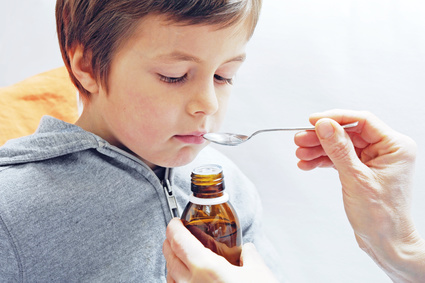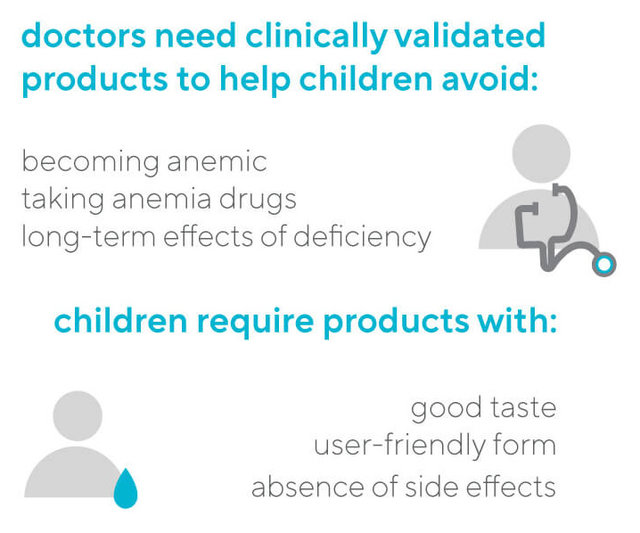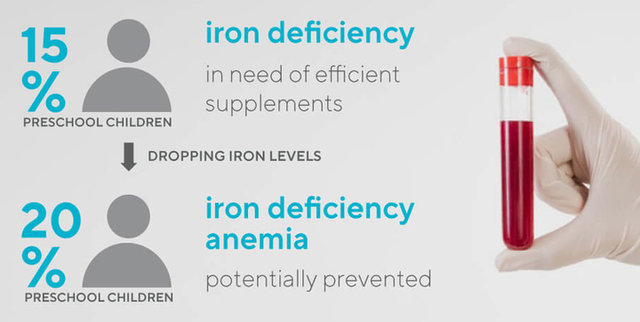THE IRON SUPPLEMENT CLINICAL TRIAL THAT DOCTORS NEED
CHILDREN'S HEALTH

Iron-deficient children and the pediatricians treating them have no products available that would be clinically proven to replenish children’s iron stores and save them from the negative consequences of prolonged deficiency. If the child’s iron status continues to drop, they can become anemic and face drugs with severe side effects. At a stage of deficiency, all pediatricians are left with is recommending a change in diet or an array of supplements with poor taste and no clinical data they could rely on. The described dilemma is astonishingly common, and it is the goal of a clinical trial on >Your< Iron Syrup by PharmaLinea to provide an answer.

A SURPRISINGLY COMMON PAIN
Iron deficiency is the most common nutritional deficiency in the world. Children are the most vulnerable population since the need for iron is increased during growth. If unaddressed, iron deficiency can cause severe neurologic and developmental issues. If iron levels continue to drop, iron deficiency can progress to iron deficiency anemia (IDA) at which point it is characterized as a disease and is treated with drugs. The latter frequently cause severe side effects (diarrhea, nausea, gastric irritation, constipation) and have poor metallic taste, making both doctors and parents try to avoid them at all costs. Around 15% of preschool children are iron-deficient and not yet anemic and about 20% of preschool children reach a deficiency level considered anemic (1, 2) - many cases could be prevented with efficient supplementation. The issue is so widespread that anemia is subject of WHO’s Global Nutrition Targets 2025 and WHO has created guidelines for preventive iron supplementation in children. Unfortunately, many iron supplements are based on poorly bioavailable iron salts, have bad metallic taste, and can cause similar side effects as drugs. For parents and their children, the market presents few user-friendly options. Doctors on the other hand, have no clinically validated solution to prescribe to iron-deficient, but not yet anemic children. There are no iron supplements proven to revert their deficiency and save them from reaching anemia. Thus, there is a vast market need for an iron supplement with clinical proof of efficacy, good compliance, and absence of side effects.
A VAST MARKET NEED
MAJA OREŠNIK
PharmaLinea Ltd. | Slovenia

Bio...

Maja Orešnik is Science & Research Director at PharmaLinea. Coming from a rich academic background in biotechnology, biochemistry, and structural biology, Orešnik began her industry career in nutritionism and medical safety. Having developed an interest in research and development connected to human health, she joined PharmaLinea and has since overseen the development of the majority of PharmaLinea’s portfolio as well as several clinical trials.
The clinical trial on >Your< Iron Syrup (a private label food supplement) was performed to assess the safety and efficacy of the product iin replenishing iron stores in iron-deficient children aged 9 months to 6 years. In total, 85 children completed the trial, providing a statistically significant sample of subjects. The main measured outcomes of interest include: the effect of supplementation on ferritin and hemoglobin levels, compliance, and occurrence of side effects. The manuscript is in process of publication at the time of writing and will be publicly available in the first half of 2021.
The trial is unique in several ways. It is the first to address the question if it is it possible for iron-deficient children to avoid anemia and drugs by taking an iron supplement. Additionally, it is the first truly relevant study on iron supplements for children, because it studies:
- only children that are iron-deficient, yet non-anemic (the relevant population for supplements)
- an iron dose that is widely considered a supplement and not a drug (1 mg iron/kg body weight/day)
It is also the only clinical trial on a private label iron supplement - others are done on drugs or branded finished products.
THE FIRST TRIAL OF ITS KINDS


PharmaLinea’s partners who have launched our iron products under their brands promote them through medical detailing and they consistently point out doctor’s demand for credible clinical data. To convince doctors, the clinical trial had to follow the highest possible standards. Trial design can vary wildly in quality and according to our experience, several points increase the credibility of a trial: oversight by an independent research institution, multiple testing centers, and a relevant number of test subjects selected by strict inclusion criteria. The latter is especially relevant for iron because trials on iron supplements or ingredients can be conducted on subjects with anemic levels of iron, making it easier to show an effect as a result of supplementation. However, trial design should avoid such compromises and include only subjects in the stage of iron deficiency - still without, or with mild anemia, as is recommended for food supplements by EFSA. Determined effects thus carry a greater value and are better applicable to the actual final users. The clinical trial on >Your< Iron Syrup is a randomized, double-blind, placebo-controlled intervention. It was conducted in multiple research centers to eliminate specifics that could make results less representative. The study was performed on a geographically dispersed, yet well-defined sample of healthy young European children living primarily in urbanized areas with regular access to primary care. No shortcuts were made to speed up returns, despite the lengthy process of recruiting a statistically significant number of subjects expanding the study to over 3 years.
GOLD STANDARDS OF TRIAL DESIGN
As is the case with all categories in food supplements, there is a great lack of high-quality clinical trials conducted on finished products in the iron supplement segment. While trials conducted on ingredients, along with the proven stability of those ingredients within the finished product, already present a level of clinical substantiation far above the average, it is effects proven on the finished product itself that the industry should strive for every time.
For food supplements in general, the pressure for clinical support is increasingly coming from the direction of educated, demanding, and digitally savvy consumers. For iron in particular, proof of efficacy is precisely the obstacle that is keeping doctors around the globe from prescribing supplements.



